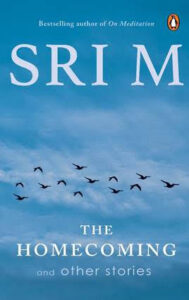Padma Bhushan SRI M sees the world in a different light. He sees the good, the bad and sometimes, the supernatural. In his quintessential no-holds barred style, Sri M’s most recent release, The Homecoming And Other Stories, urges one to delve deep into the human spirit and get a glimpse of why people do the things they do through a collection of 13 short stories. In an interview with SAURABH TANKHA, the spiritual guide and tells us why people do what they do, what is spirituality, his life and more…
What is that you, as an author as also a spiritual teacher, social reformer and educationist, want to share with your readers through the stories of The Homecoming And Other Stories (Penguin Books)?
This is a work of fiction and I don’t intend to preach any point of view, spiritual, educational or social. I want the reader to enjoy reading the stories and draw their own conclusions. Of course, any work would have traces of the author’s philosophy or life but that’s not for me to push down the readers’ throat.

There is no fiction without fact. Fiction is generally embroidered facts with twists in the narrative that may be more interesting than facts
Under Acknowledgements in The Homecoming And Other Stories, you write that Ernest Hemingway’s works inspired you to state facts directly and not exaggerate too much. Does that mean the 13 short stories in The Homecoming And Other Stories are real-life incidents that have been turned into stories to let readers get a glimpse of why people do the things they do?
There is no fiction without fact. Fiction is generally embroidered facts with twists in the narrative that may be more interesting than facts. Yes, Hemingway’s works inspired me but not in the context. What I meant was the constructions of sentences, straight and to the point without too many adjectives and adverbs. Direct narrative without too much of beating around the bush.
What role do awards and rewards play in the journey you have undertaken?
No role although I appreciate it when my work is acknowledged. The journey itself is interesting not merely the end.
When, how and why did Mumtaz Ali Khan become Sri M?
M is the first letter of my given name (Mumtaz) by birth and also by my guru when he initiated me into spiritual practices. Sri is added in Hindustan’s culture like Mr is added in the British culture.
The spiritual path is to be studied in depth to understand spiritual experiences. There is no shortcut and there is no one common format
What were the learnings during the three years in the Himalayas?
I learnt many aspects of yoga and philosophy that would fill many volumes and learnt to survive in the harshest of conditions.
What made you return to the plains?
I returned to the plains to share what I had learnt.
What is spirituality and how does one experience it?
The spiritual path is to be studied in depth to understand spiritual experiences. There is no shortcut and there is no one common format. The ancient spiritual teachings of this country are so vast, they cannot be encapsulated in a few words.
What is life and what is death?
Life is when you are living and death is when life stops.
Who has been the most inspirational person in your life and why?
Swami Vivekananda who demystified spiritual teachings, made them direct and crystal-clear free of all superstition and also taught the great values of service to humanity, a core spiritual necessity.
The moment spirituality becomes a cult, with a cult figure and the rest of the paraphernalia, it makes one dependent and passive
A message for our readers.
Spiritual teachings are to understand the core of our consciousness, by un-conditioning the mind and thereby have access to tremendous energy which may be tapped creatively. Spirituality is not a cult and the moment it becomes one, with a cult figure and the rest of the paraphernalia, it makes one dependent and passive. What is required of the true spiritual seeker, is to be independent, fearless and stand on one’s own feet, realising that the divinity one seeks is within the core one’s being, in fact it’s one essential self, the eternal consciousness called the Supreme Brahman.